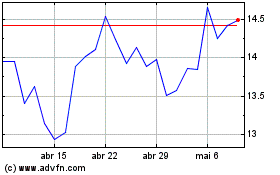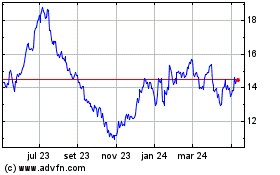By Andrew Tangel and Doug Cameron
Boeing Co. ousted Chief Executive Dennis Muilenburg as the
company struggles with an extended crisis caused by two fatal
crashes of its 737 MAX jetliner and friction with regulators over
returning the grounded planes to service.
The aerospace giant said David Calhoun, a longtime Boeing
director with deep ties to the aviation and private-equity
industries, will become CEO next month. He was named Boeing's
chairman in October in a boardroom shake-up.
Mr. Calhoun, 62 years old, is stepping down as a senior
executive at private-equity giant Blackstone Group Inc. An
experienced corporate fixer, he is also a former top executive at
airplane engine-maker General Electric Co.
Mr. Calhoun and Boeing finance chief Greg Smith, who will serve
as interim CEO, face the same challenges as Mr. Muilenburg: winning
back the confidence of government officials, suppliers, airlines
and the traveling public. Mr. Calhoun spent much of Monday phoning
some of those constituents, including lawmakers, a Boeing spokesman
said.
In a call with one U.S. airline CEO, Mr. Calhoun struck a tone
of partnership and signaled Boeing would be taking a different
tack, said a person familiar with the call. Airlines have lost
money as they have been forced to adjust schedules that were
dependent on a MAX fleet that should have numbered about 800 jets
by now, only for all to be grounded.
Regulators had criticized Mr. Muilenburg's efforts to reassure
customers and the financial community that government approval of a
fix for the MAX was coming soon -- optimism that repeatedly proved
misplaced. The new leadership team made it clear in public
statements Monday that they won't get ahead of regulators in
predicting the return to service of the 737 MAX after its grounding
in March following twin crashes that claimed 346 lives.
Boeing's board decided to oust Mr. Muilenburg during a
conference call late Sunday following discussions over the weekend,
according to a Boeing official and a person close to the board.
Their decision culminated a series of setbacks for the plane maker
that led to its recent decision to halt production of the 737 MAX
-- its best-selling plane -- starting next year, according to the
person close to the board.
Directors were also dissatisfied at times with delays by
management in providing them updates, this person said. "There were
some surprises along the way," this person added, without providing
specifics.
The malfunction of Boeing's Starliner space capsule during its
maiden flight on Friday, which left it unable to dock with the
international space station, added to setbacks at the Chicago-based
company. Mr. Muilenburg tweeted his congratulations to the
Starliner team before the problem was disclosed on Friday.
The company has lost around $50 billion in market value since
the MAX crisis began, with the stock off 24% from its level prior
to the second crash in March. Boeing shares rose about 2.5% in
Monday trading, recently at $337.26.
The MAX's return to service won't happen until regulators
approve fixes to a flight-control system implicated in the two
crashes. And board members have been particularly concerned about
increasing friction with the Federal Aviation Administration, which
ultimately holds the key, the person familiar with the board said,
calling the tension a "very significant and negative
development."
With the leadership change, Boeing's board wanted to signal it
would improve communication, particularly with regulators and
customers, the person said.
An engineer by training, Mr. Muilenburg appeared to often rely
heavily on data and legal advice rather than diplomacy in
formulating his response to the escalating crisis, and his approach
sometimes exacerbated friction with customers and regulators. His
relationship with FAA leaders deteriorated to the point that about
two weeks ago agency chief Steve Dickson publicly called out the
company's failures to provide complete and timely data supporting
proposed MAX software fixes.
After Boeing's announcement Monday, the FAA reiterated that it
has set no timetable for when the MAX would be allowed to resume
carrying passengers. It also said that it expects Boeing to focus
on "the quality and timeliness of data submittals for FAA review,
as well as being transparent with its relationship with the
FAA."
Mr. Calhoun, who is set to become CEO on Jan. 13, has been a
Boeing director since 2009. He spent 26 years at GE, including
running its aircraft engine business.
At Blackstone, he has confronted other major corporate crises.
He is credited with turning around the fortunes of Nielsen Holdings
PLC after being put in charge of the market research and
measurement company. He later became chairman of Caterpillar Inc.'s
board weeks after federal agents raided the heavy machinery maker's
Illinois headquarters. Both he and Mr. Muilenburg are on
Caterpillar's board.
Directors and executives who have worked with Mr. Calhoun say
his experience will help Boeing overcome its problems. Inside
boardrooms, his personality looms large, and he became increasingly
assertive inside Boeing's boardroom as problems mounted this year,
his colleagues have said.
Mr. Smith, who has spent most of his career at Boeing except for
a stint running investor relations at Raytheon Co, is well
respected by the investment community. As Boeing's finance chief,
he expanded his role in recent years to reduce risk on the
company's balance sheet and focus on a raft of efficiency measures,
He also has led efforts to realign production and negotiate
customer compensation following the MAX grounding.
On Monday, Mr. Smith pledged to help "chart a new direction for
Boeing," in a note to staff viewed by The Wall Street Journal.
He isn't joining the company's board, more than half of whose
members were directors when the decision was made in 2011 to
proceed with the 737 MAX rather than counter rival Airbus SE with
an all-new airplane. The board's makeup has prompted criticism from
some investors and analysts that Boeing needs to reset its internal
culture.
Larry Kellner, a veteran airline executive who has been on the
Boeing board since 2011, will take over from Mr. Calhoun as
chairman.
Mr. Muilenburg's defense of Boeing's development of the MAX
after the second crash in March made him a target of criticism,
though he subsequently apologized to victims' families on multiple
occasions and acknowledged Boeing made mistakes.
Michael Stumo, who lost a daughter in the Ethiopian crash,
called Mr. Muilenburg's departure "a good first step," but also
said several board members should resign.
Mr. Muilenburg became CEO in July 2015. Before the MAX
grounding, Boeing shares had more than tripled on his watch as the
company boosted jetliner production and returned a bigger portion
of profits to shareholders through stock buybacks and higher
dividends.
Mr. Muilenburg is eligible to a $39 million payout, including
$6.6 million in cash as well as bonuses and stock awards, based on
share price of $322.50, according to regulatory filings.
Boeing's new leadership will have its hands full. The company is
suspending production of the MAX in 2020 amid uncertainty over the
aircraft's future, which will pressure Boeing's finances, suppliers
and the U.S. economy.
The crisis has disadvantaged Boeing in its competition with
Airbus to supply carriers in a fast-growing air travel market. The
two plane makers have a backlog of more than 13,000 jet orders,
representing seven years of production. Boeing had planned to build
more than 900 aircraft this year, including almost 600 MAX
jets.
The company, which has about 5,000 MAX orders in hand, estimates
the MAX crisis will cost it $10 billion in added costs and customer
compensation, a figure analysts expect to at least double.
The FAA isn't expected to approve the MAX software fixes, as
well as related changes to pilot training, before February,
according to people familiar with the matter.
Dennis Tajer, a spokesman for the union that represents pilots
at American Airlines Group Inc., said pilots are seeking "actions
that are desperately needed in rebuilding trust in Boeing."
The FAA's own pilots may pose hurdles to the return of the MAX.
Some of them contend tests so far suggest airline crews need
simulator drills to prepare for certain emergencies involving the
flight-control system, according to people familiar with the
details. A final decision will likely take weeks, and involve
various other pilots inside and outside the agency.
--Andy Pasztor and Alison Sider contributed to this article.
Write to Andrew Tangel at Andrew.Tangel@wsj.com and Doug Cameron
at doug.cameron@wsj.com
(END) Dow Jones Newswires
December 23, 2019 15:38 ET (20:38 GMT)
Copyright (c) 2019 Dow Jones & Company, Inc.
American Airlines (NASDAQ:AAL)
Gráfico Histórico do Ativo
De Mar 2024 até Abr 2024

American Airlines (NASDAQ:AAL)
Gráfico Histórico do Ativo
De Abr 2023 até Abr 2024
